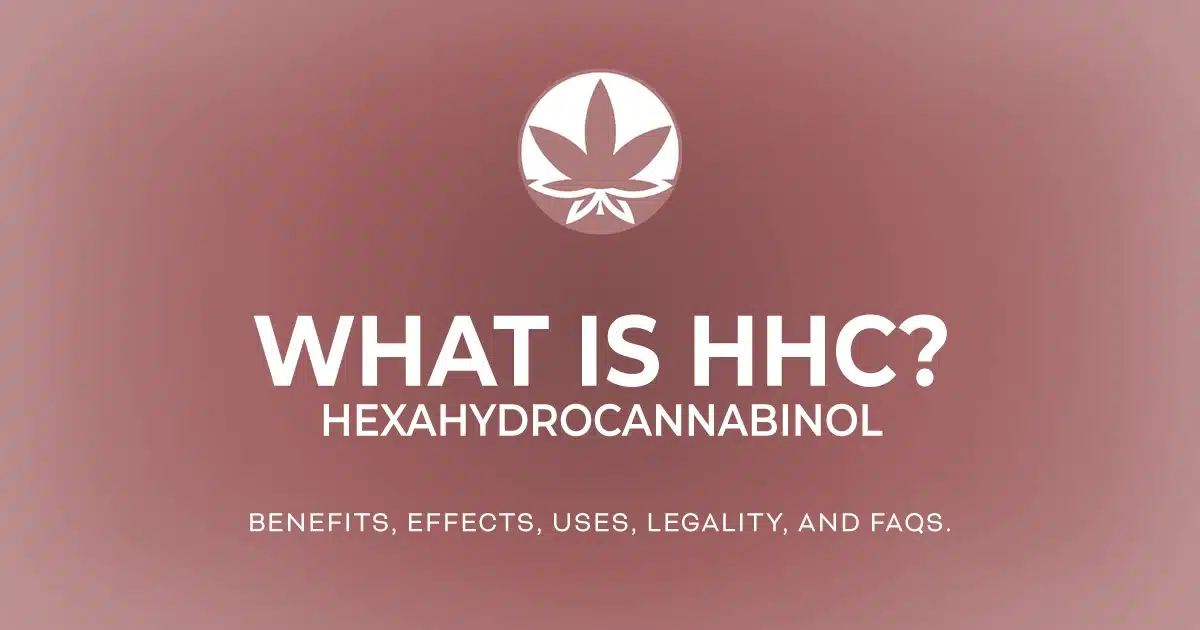What is HHC?


Christopher Visser
Multi-Cannabis Business Owner
Christopher Visser, the Founder and CEO of Cannabidiol Life and THCGummies.com, is a distinguished figure in the CBD industry, recognized for his pioneering contributions since 2016. With over 120 published articles, Christopher has become a reputable cannabis researcher, writer, and author. He's built two prosperous cannabis ventures that collectively generated millions in annual sales. His in-depth analysis of numerous cannabis studies, collaboration with medical professionals, and personal engagement with thousands of customers underline his expertise and commitment to advancing cannabis understanding daily.
-
 Written By:
Christopher Visser
Written By:
Christopher Visser
- Published:
- Updated: February 8, 2024
- Too Quiet, Light Up The Convo!
A complete overview of HHC (Hexahydrocannabinol). This article covers potential benefits of HHC, its effects, uses, federal legality, and overall safety.
Table of Contents
- Tags: Semi-Synthetic, Synthetic, What Is
In recent years, the world of cannabinoids has expanded beyond the well-known THC and CBD, introducing new cannabinoid compounds with unique properties. One such compound is Hexahydrocannabinol (HHC), a semi-synthetic cannabinoid that has caught the attention of cannabis enthusiasts and researchers alike. But what exactly is HHC, and how does it differ from its more famous cousins? To answer this question, we need to explore “what is HHC?”
As we dive into the fascinating world of HHC, we’ll explore its origins, effects, benefits, and risks, as well as its legal status and consumption methods. By the end of this journey, you’ll have a comprehensive understanding of this lesser-known cannabinoid and be able to make informed decisions about its potential use in your own life.
Short Summary
HHC is a THC analog with reduced potency, making it an appealing alternative for recreational and medicinal purposes.
Potential therapeutic benefits of HHC include anti-inflammatory, antioxidative, anti-emetic and sedative effects. Safety concerns should be considered before use.
Responsible consumption practices such as moderation and frequent monitoring can help ensure a safe experience while minimizing tolerance development.
Exploring HHC: The THC Analog
HHC is a semi-synthetic cannabinoid derived from hydrogenating THC, the well-known psychoactive compound found in cannabis plants. This process results in a compound with similar effects to THC but with less potency, making it an intriguing alternative for those seeking a more manageable psychoactive cannabinoid experience.
Whether found naturally in high-potency cannabis plants or synthesized in a lab, HHC offers a unique twist on the conventional cannabis-derived THC experience.
The Science Behind HHC
At a molecular level, HHC and THC share a striking resemblance. The primary difference lies in the hydrogenation process, which introduces two hydrogen atoms to the THC molecule, altering its molecular weight and improving its stability. This modification with hydrogen molecules results in a compound with a longer shelf life and reduced susceptibility to damage caused by UV light and heat.
The similarities in chemical structure between HHC and THC also extend to their mechanisms of action within the human body. Both compounds bind to the same CB1 and CB2 receptors in the endocannabinoid system, leading to their psychoactive effects. However, HHC’s hydrogenation process imparts a reduced potency compared to delta-9 THC, making it an appealing alternative for those seeking a milder experience.
Natural vs. Synthetic Origins
HHC is often classified as a “semi-synthetic” cannabinoid due to its occurrence in cannabis and hemp plants and its production through the hydrogenation process. This process typically begins with hemp-derived cannabinoids, which are then subjected to hydrogenation under pressure with a catalyst such as palladium. The resulting HHC can be found in various products, including vape cartridges and gummies, offering a range of consumption options for users.
The semi-synthetic nature of HHC means that it straddles the line between natural and synthetic origins. While it can be found naturally in some high-potency cannabis plants, the majority of HHC products on the market are synthesized through the hydrogenation process. This distinction is important to keep in mind when considering the legal status and potential effects of HHC.
HHC Effects and Benefits
When it comes to the effects of HHC, its close relationship with THC becomes apparent. As HHC binds to the same receptors as THC within the endocannabinoid system, it can produce psychoactive effects such as mood and appetite alterations.
Furthermore, HHC may offer potential therapeutic benefits due to its anti-inflammatory, antioxidative, and anti-emetic properties, making it an intriguing compound for both recreational and medicinal users.
Psychoactive Properties
As a psychoactive compound, HHC produces effects that are similar to those of THC, inducing feelings of intoxication, relaxation, and euphoria. It can also increase appetite, making it an appealing option for those seeking a cannabinoid experience that is milder than delta-9 THC. However, it’s important to be aware of the potential adverse effects associated with HHC use, such as dizziness, dry mouth, red eyes, memory loss, and anxiety.
Despite these side effects, many users find that the psychoactive properties of HHC offer a unique and enjoyable experience. The reduced potency compared to delta-9 THC allows for greater control over the intensity of the effects, providing an opportunity to tailor the experience to individual preferences and needs.
Potential Therapeutic Uses
Beyond its psychoactive properties, HHC may also offer a range of potential therapeutic benefits. Its structural similarity to THC suggests that it could have anti-inflammatory, antioxidative, and anti-emetic effects, although further research is needed to confirm these claims. Some studies have indicated that HHC might have anxiolytic effects, which could be useful in managing anxiety, while its sedative properties may hold promise for those struggling with insomnia.
It’s important to note that while the potential therapeutic uses of HHC are promising, the research in this area is still in its early stages. As such, it’s crucial to approach HHC with caution and to consult with a healthcare professional before using it for medicinal purposes.
Safety Concerns and Side Effects
While HHC may offer a range of intriguing effects and benefits, it’s essential to be aware of the potential safety concerns and side effects associated with its use. Some of the most common side effects of HHC include anxiety, drowsiness, nausea, dry mouth, and low blood pressure.
As with any cannabinoid, it’s important to approach HHC with caution, especially when trying it for the first time or using a new product.
Common Side Effects
The common side effects associated with HHC use include feelings of anxiety and paranoia, drowsiness, nausea and upset stomach, dry mouth, dry eyes, dizziness or lightheadedness, increased appetite, insomnia, and red eyes. These side effects can vary in intensity depending on the individual and the dosage of HHC consumed. It’s important to start with a low dose and monitor your body’s reaction to determine the appropriate dosage for you.
In addition to these common side effects, it’s worth noting that HHC can also interact with other medications, leading to potential drug interactions. If you’re currently taking any prescription medications, it’s crucial to consult with your healthcare provider before using HHC to ensure that it’s safe for you to do so.
Manufacturing Risks
The production of HHC involves a series of chemical processes that, if not carried out correctly, can result in hazardous products. In the early 2000s, the recreational use of synthetic cannabinoids such as K2 and Spice posed a significant public health risk, as these compounds did not behave in the same manner as naturally-derived cannabinoids and were found to have severe health implications.
While HHC is not directly comparable to these synthetic cannabinoids, the potential risks associated with incorrect manufacturing techniques should not be overlooked. To ensure the safety and quality of HHC products, it’s crucial to purchase them from reputable manufacturers and retailers who provide third-party lab testing results.
These tests can help to verify the potency, purity, and safety of HHC products, giving you peace of mind and confidence in hemp products of your choice.
Legality and Drug Testing
The legality of HHC is a complex and evolving issue, with its semi-synthetic nature placing it in a gray area. While HHC is considered federally legal if derived from hemp with less than 0.3% THC, some states have banned all THC analogs, leading to confusion and uncertainty regarding its legal status.
Additionally, HHC’s presence in drug tests raises further concerns, as testing positive for HHC could have legal implications depending on the jurisdiction.
Legal Ambiguity
The 9th U.S. Circuit Court of Appeals has given its approval that all hemp derived cannabinoid-related compounds and derivatives are allowed as long as they have a delta 9 THC content of below 0.3%. This is in accordance with the existing legal regulations. This ruling provides legal protection to manufacturers and sellers of HHC products as long as they meet these criteria.
However, it’s important to note that individual states can still choose to ban HHC or other THC analogs, leading to a patchwork of regulations across the country.
As a consumer, it’s crucial to stay informed about the legal status of HHC in your jurisdiction and to purchase products from reputable sources that adhere to these regulations. Additionally, it’s important to be aware of the potential consequences of testing positive for HHC in drug tests, as this could have implications for your legal standing depending on the specific circumstances.
Drug Test Considerations
When it comes to drug testing, there is currently no concrete evidence to suggest that HHC can evade detection in tests specifically designed for marijuana. However, given its similarity to THC and other cannabinoids, it’s possible that HHC could be detected in some drug tests, leading to potential legal implications for users.
To minimize the risk of testing positive for HHC, it’s recommended to refrain from using any substances before a drug test. While no guarantees can be made, being cautious and informed about the potential risks associated with HHC and drug testing can help to protect you from unexpected consequences.
Consumption Methods and Dosage
HHC can be consumed in various ways, including vaping and edibles, offering flexibility and choice for users. When it comes to determining the appropriate dosage of HHC, it’s essential to start with a low dose and gradually increase until the desired effects are achieved.
This approach allows users to tailor their HHC experience to their individual needs and preferences.
Vaping and Edibles
Vaping HHC offers a manageable dosage and a subtle sense of euphoria, with the added benefit of a rapid onset of effects. However, it’s important to be aware of the potential risks associated with vaping HHC, such as respiratory irritation, increased risk of addiction, and exposure to toxic chemicals. It’s essential to use vaping devices designed specifically for HHC and to follow the manufacturer’s guidelines to ensure safe consumption.
Edibles containing HHC, such as HHC gummies, provide a discreet and convenient method of consumption. With edibles, it’s important to remember that the effects may take longer to appear compared to vaping, as the HHC must be metabolized by the body before its effects are felt. This delayed onset can lead to the temptation to consume more than the recommended dosage, so it’s crucial to be patient and wait for the effects to manifest before considering increasing the dose.
Determining the Right Dose
Finding the appropriate dosage of HHC can be a process of trial and error, as individual tolerance levels and desired effects can vary greatly. It’s recommended to begin with a low dose of around 5-10 mg and observe the effects before increasing the dosage. This cautious approach allows users to gauge their body’s reaction to HHC and find the ideal dosage for their specific needs.
As you become more experienced with HHC, you may find that your tolerance increases, necessitating a higher dosage to achieve the desired effects. It’s important to monitor your consumption and take breaks from using HHC to prevent developing a tolerance and to ensure that you continue to enjoy its benefits safely and responsibly.
Building Tolerance and Responsible Use
As with any cannabinoid, the possibility of building tolerance to HHC is a concern for users. Tolerance occurs when the body adapts to the presence of a drug, leading to a decreased response to its effects over time. While no studies have specifically examined HHC tolerance, its similarity to THC suggests that the development of tolerance could be a potential issue.
Therefore, moderation and responsible use are crucial to ensure a safe and enjoyable HHC experience.
Tolerance Development
Tolerance to HHC refers to the body’s adaptation to the drug, resulting in a decrease in the desired effects of the drug over time. As the body becomes accustomed to the drug, a higher dosage is required to achieve the same effects. This tolerance development can lead to withdrawal symptoms such as irritability, anxiety, and difficulty sleeping, as well as the typical characteristics of addiction, including cravings, tolerance, and withdrawal symptoms.
To minimize the risk of developing a tolerance to HHC, it’s important to practice moderation and take breaks from using the compound. By allowing your body time to reset and recover, you can help maintain the effectiveness of HHC and reduce the risk of addiction and negative side effects.
Tips for Safe Consumption
When it comes to the safe consumption of HHC, several recommendations can help to ensure a positive experience. Firstly, start with a low dose and incrementally increase until the desired effects are achieved. This approach allows you to gauge your body’s reaction to HHC and find the appropriate dosage for your specific needs.
Secondly, monitor your consumption and take breaks from using HHC to prevent the development of tolerance and maintain its effectiveness.
Lastly, it’s essential to be aware of the potential risks associated with HHC use, including the development of tolerance, addiction, and negative side effects. By staying informed and practicing responsible use, you can enjoy the unique benefits of HHC while minimizing the risks and ensuring a safe and enjoyable experience.
Summary
In conclusion, Hexahydrocannabinol (HHC) represents a fascinating addition to the ever-expanding world of cannabinoids. As a semi-synthetic cannabinoid with similar effects to THC but reduced potency, HHC offers a unique alternative for those seeking a milder cannabinoid experience. From its origins and production processes to its effects, benefits, and risks, HHC presents a complex and intriguing compound that continues to capture the attention of the cannabis industry, enthusiasts and researchers alike.
As we continue to learn more about HHC and its potential applications, it’s essential to approach its use with caution, moderation, and responsibility. By staying informed and following the guidelines outlined in this blog post, you can safely explore the world of HHC and enjoy the unique experiences it has to offer.
Frequently Asked Questions
Will HHC get me high?
It is unclear if HHC will have any psychoactive effects on the user, and thus will likely not get you “high” in the traditional sense. While its effects may differ from person to person, it does not appear to produce a significant euphoria or alteration of consciousness.
What does HHC do?
HHC is a naturally occurring cannabinoid found in the cannabis plant that interacts with the endocannabinoid system in your body to produce therapeutic effects. It binds to the CB1 receptor, producing similar, though milder, effects than THC such as relaxation, improved mood and increased appetite.
HHC helps you manage various health issues without the fear of intoxication.
What feeling does HHC give you?
HHC offers users a calming and uplifting experience with its mild body high and elevated mood. It is slightly more potent than Delta 8 THC, but still less powerful than Delta 9 THC, allowing for a comfortable and relaxing feeling without the disorientation that can sometimes come with marijuana use.
This makes HHC an ideal choice for those looking for a milder experience than Delta 9 THC, but still want to enjoy the benefits of cannabis.
Is HHC stronger than THC?
Overall, THC has a stronger high than HHC as it has a double bond on the ninth carbon chain, which is not present in HHC.
Despite this, both compounds have similar wellness benefits, such as stress relief, pain relief, and relaxation.

If this article sparked a new insight, pass the flame…
LET’S IGNITE RIPPLES OF CANNABIS WISDOM.
Be the catalyst for someone’s breakthrough moment.
SHARE ON SOCIAL MEDIA

YOUR CANNABIS EDIBLE
JOURNEY CONTINUES:
Looking For Something Else?



